- Home
- Paulo Coelho
The Winner Stands Alone Page 14
The Winner Stands Alone Read online
Page 14
WORDS. THE STAR THINKS OF his favorite line from a poem, one that he learned when still at school, and which frightens him more and more as time passes: "You would have to give up all else, I alone would expect to be your sole and exclusive standard." Choosing is perhaps the most difficult thing any human being has to do. As the actress tells her story, he sees his own experiences being reflected back at him.
He remembers his first big chance, which he won thanks to his talent as a theater actor. He remembers how his life changed from one minute to the next, and the fame that overtook him so fast that he didn't really have time to adapt and ended up accepting invitations to places he shouldn't have gone to and rejecting meetings with people who would have helped him go much further in his career. Then there was the money he earned, which wasn't actually that much, but which gave him a sense that he could do anything; there were the expensive presents, the forays into an unfamiliar world, the private planes, the five-star restaurants, and the hotel suites that resembled the palatial rooms of kings and queens as imagined by a child. There were the first reviews, full of respect and praise and words that touched his heart and soul; there were the letters that flooded in from around the world and which he used to answer individually, even arranging to meet some of the women who sent him their photos, until he realized that he simply couldn't keep up that pace, and his agent terrified him by warning him that he could easily become the victim of some entrapment. Nevertheless, even now he still gets a special pleasure out of meeting the fans who have followed every step of his career, who create Web pages devoted to his work, distribute little magazines describing everything that's going on in his life--the positive things, that is--and defend him against any attacks in the press, when some performance of his doesn't receive the praise it deserves.
And with the passing years, what had once seemed a miracle or the luckiest of chances and which he had always promised himself he would never become enslaved by, has gradually become his sole reason to go on living. Then he looks ahead and feels a twinge of anxiety that it all might end one day. There were always younger actors prepared to accept less money in exchange for more work and more visibility. He's noticed that people talk only about the great film that propelled him to fame and which everyone knows about, even though he's made another ninety-nine films since that no one really remembers.
The financial conditions are no longer the same either because he made the initial mistake of thinking he would always have work and forced his agent to keep his fee very high. As a result, he got fewer and fewer offers, even though now he charges only half his normal fee to appear in a film. Feelings of despair are beginning to stir in a world which, up until then, had been made up entirely of the hope that he would get ever farther, ever higher, and ever more quickly. He cannot allow himself to lose his value just like that, and so now, whenever a script arrives, regardless of its quality, he has to say that he really loves the part they're offering him and that he is willing to do it even if they're unable to offer him his usual fee. The producers pretend to believe him, and his agent pretends that he's managed to pull the wool over their eyes, but he knows that his "product" needs to keep being seen at festivals like this one, always busy, always polite, always slightly distant, as movie legends should be.
His press officer has suggested that he should be photographed kissing a famous actress so that the resulting photo can appear on the cover of one of the scandal rags. They've already been in contact with the actress in question, who is also in need of a little extra publicity, so now it's simply a matter of choosing the right moment during tonight's gala supper. The clinch should appear spontaneous, although they'll have to be sure there's a photographer nearby, without, of course, seeming to be aware that they're being watched. Later on, when the photos are published, they'll hit the headlines again, denying any love interest and declaring that the photo was an invasion of privacy; lawyers will start legal proceedings against the magazines, and the press officers of both parties will do their best to keep the affair alive for as long as possible.
Despite his many years of work and despite being internationally famous, his situation is not so very different from that of this young actress.
You would have to give up all else, I alone would expect to be your sole and exclusive standard.
GIBSON INTERRUPTS THE THIRTY-SECOND SILENCE that has fallen upon this perfect scene: the yacht, the sun, the iced drinks, the cries of the seagulls, the cooling breeze.
"I assume you'd like to know about the role you'll be playing because the title of the film could change between now and its premiere. Well, you'll be playing opposite him."
And he indicates the Star.
"That is, you'll be playing one of the principal roles. Your next question, logically enough, must be: why me and not some big-name movie star?"
"Exactly."
"Money. For the script I've been asked to direct, and which will be the first film produced by Hamid Hussein, we have a very limited budget, half of which will go on promotion rather than on the final product. So we need a big name to pull in the crowds and a complete unknown, who'll be cheap, but will get lots of media attention. This isn't anything new. Ever since the movie industry became a force in the world, the studios have always done this in order to keep alive the idea that fame and money are synonymous. I remember, when I was a boy, seeing those great Hollywood mansions and thinking that all actors must earn a fortune.
"Well, it's a lie. There are maybe ten or perhaps twenty stars worldwide who can honestly say that they do earn a fortune, the rest live on appearances: in a house rented by the studio, wearing clothes and jewelry lent by couturiers and jewelers, driving cars on short-term loan from companies who want their name to be associated with the high life. The studio pays for all that glamour, and the actors earn very little. This isn't the case of our friend here, of course, but it will be with you."
THE STAR DOESN'T KNOW IF Gibson is being sincere and if he really does include him among the major stars, or if he's just being sarcastic. Not that it matters, just as long as they sign the contract, the producer doesn't change his mind at the last minute, the screenwriters manage to deliver the script on time, they keep strictly to the budget, and an excellent PR campaign is set in motion. He's seen hundreds of projects come to nothing; that's just a fact of life. However, his last film went almost unnoticed by the public, and he desperately needs a runaway success. And Gibson is in a position to produce just that.
"I accept," says the young woman.
"We'll discuss everything with your agent. You'll sign an exclusive contract with us. For the first film, you'll earn five thousand dollars a month for a year, and you'll have to attend parties and be promoted by our PR department, go wherever we send you and say what we want you to and not what you think. Is that clear?"
Gabriela nods. What could she say? A secretary in Europe could earn five thousand dollars a month, but it was either take it or leave it, and she doesn't want to appear even a tiny bit hesitant. She understands the rules of the game.
"So," Gibson says, "you'll be living like a millionairess and behaving like a big star, but always remember: none of that is true. If all goes well, we'll increase your salary to ten thousand dollars for the next film. Then we'll talk again because you'll probably be thinking: 'One day, I'll get my revenge.' Naturally, your agent has heard our terms and knows what to expect. Or perhaps you didn't realize that."
"It doesn't matter, and I have no intention of seeking revenge."
Gibson pretends not to have heard.
"I didn't call you here to talk about your test: it was great, the best I've seen in a long time. The casting director thought the same. I called you here to make sure you understand, from the start, just what you're getting into. After their first film, when they feel like the world is at their feet, a lot of actresses or actors want to change the rules. But they've signed contracts and know that's impossible. Then they fall into a kind of black depression, go into auto-d
estruct mode, that kind of thing. So our policy now is to set out plainly how it's going to be. If you're successful, you'll have to learn to live with two women: one of them will be adored by people around the world, while the other will be constantly aware that she has no power at all.
"So, before you go to the Hilton to collect your clothes for the night, think long and hard about the consequences. When you enter that hotel suite, you'll find four copies of a vast contract waiting for you. Before you sign it, the world is yours and you can do what you like with your life, but the moment you sign, you're no longer the mistress of anything. We will control everything from the way you cut your hair to where you eat, even if you're not hungry. Obviously you can use your new-won fame to earn money from advertising, which is why people accept these conditions."
The two men get up. Gibson asks the Star:
"Do you think you'll enjoy acting with her?"
"She'll be great. She showed real feeling in a situation where most people are simply trying to look competent."
"Oh, and, by the way, don't go thinking this yacht is mine," says Gibson, after calling someone to accompany her to the launch that will return her to shore.
She gets the message.
3:44 P.M.
"Let's go up to the terrace and have a coffee," says Ewa.
"But the show starts in only an hour from now, and you know what the traffic's like."
"There's still time for a cup of coffee."
They go up the stairs, turn right, and walk to the end of the corridor. The security guard there knows them already and barely acknowledges them. They walk past glass cases full of jewelry studded with diamonds, rubies, and emeralds, and emerge into the sunlight on the first-floor terrace. The same very famous jewelry firm hires the area every year to receive friends, celebrities, and journalists. It's furnished in the very best of taste, and there's always a table groaning with a constantly replenished supply of delicacies. They sit down at a table shaded by a parasol. A waiter comes over, and they order a sparkling mineral water and an espresso. The waiter asks if they would like something from the buffet, but they decline, saying that they've already eaten. In less than two minutes, he's back with their order.
"Is everything all right?" he asks.
"Yes, thank you, excellent."
"No," thinks Ewa, "things couldn't be worse, although at least the coffee's good."
Hamid knows that something strange is going on with his wife, but prefers to leave that conversation for another time. He doesn't want to think about it. He doesn't want to risk hearing something along the lines of "I'm leaving you." He is disciplined enough to control his feelings.
At one of the other tables sits one of the most famous designers in the world, with his camera beside him. He's staring into space, as if hoping to make it clear that he doesn't want to be disturbed. No one approaches him, and whenever some ill-advised person attempts to do so, the hotel's PR lady, a pleasant woman in her fifties, asks them politely to leave him alone; he needs a respite from the constant barrage of models, journalists, clients, and impresarios.
Hamid remembers their first meeting, so many years ago now that it seems like an eternity. He had been in Paris for eleven months, made a few friends in the fashion world, knocked on various doors and, thanks to contacts furnished by the sheikh (who may have known no one in that particular world, but had influential friends in high places), had landed a job as a designer for one of the most respected names in haute couture. Instead of making sketches based on the materials he was given, he used to stay at the studio until late at night, working with the fabrics he had brought from his own country. During that period, he was twice summoned home. The first occasion was when he learned that his father had died and left him the small family business. Even before he'd had time to think about it, he was informed by one of the sheikh's emissaries that someone would be taking over the business and making the necessary investments to ensure that it prospered, but that ownership would remain in his name.
He asked why, since the sheikh had shown no knowledge of or interest in the subject.
"A French luggage manufacturer is setting up business here. The first thing they did was seek out local fabrics, which they've promised to use in some of their luxury goods. So not only do we already have one client, we can continue to honor our traditions and keep control of the raw material."
Hamid returned to Paris knowing that his father's soul was in Paradise and that his memory would remain in the land he had so loved. He continued working late into the night, making designs with Bedouin themes and experimenting with the fabrics he had brought back with him. If that French company--known for its innovative designs and good taste--was showing an interest in local products, then news of this would soon reach the capital of fashion and there was sure to be a big demand. It was only a matter of time, but news traveled fast.
One morning, he was called in to see the director. This was the first time he had entered that inner sanctum, the great couturier's office, and he was astonished to see how untidy it was. There were newspapers everywhere, papers piled high on the couturier's antique desk, a vast quantity of photos taken of him with various celebrities, framed magazine covers, fabric samples, and a vase full of white feathers of all sizes.
"You're very good at what you do. I had a look at the sketches you leave around for all to see. I'd be careful about doing that if I were you. You never know when someone might change jobs and steal any good ideas they picked up here."
Hamid didn't like to think he was being spied on, but he said nothing, and the great couturier went on:
"Why do I think you're good? Because you come from a country where people dress very differently, and you're beginning to understand how to adapt those fashions to the West. There's just one problem: we can't buy those fabrics here; also your designs have religious connotations, and fashion is, above all, about clothing the body, although it does inevitably reflect a great deal of what's going in the soul as well."
He went over to one of the piles of magazines, and as if he knew exactly what was there, he picked up a particular copy, possibly bought from the bouquinistes--the booksellers who have been selling their wares on the banks of the Seine since the days of Napoleon. It was an old Paris Match with a picture of Christian Dior on the cover.
"What makes this man a legend? I'll tell you: his ability to understand human beings. Of all the many fashion revolutions, one merits special mention. Immediately after the Second World War, when cloth was in such short supply in Europe that there was barely enough to make clothes at all, he started designing dresses that required an enormous amount of fabric. By doing so, he was not only showing off a beautiful woman beautifully dressed, he was selling the dream that we would once again return to a time of elegance, abundance, and plenty. He was attacked and insulted for doing this, but he knew he was going in the right direction, which is always the opposite direction to everyone else."
He put the magazine back exactly where he had taken it from and returned, holding another one.
"And here is Coco Chanel. She was abandoned by her parents, became a cabaret singer, and was just the kind of woman who could expect only the worst from life. But she seized the one chance she had--in her case, a series of rich lovers--and transformed herself into the most important female couturier of her day. What did she do? She liberated women from the slavery of corsets, those instruments of torture that imprisoned the torso and prevented all natural movement. She made only one mistake: she concealed her past, when that would, in fact, have helped her become an even greater legend--the woman who had survived despite all."
He put that magazine back in its place too. Then he went on:
"You might ask: why didn't they do that before? We'll never know. People must have tried--couturiers who have been completely forgotten by history because they failed to reflect in their collections the spirit of the times they were living in. Chanel needed more than creative talent and rich lovers to have the imp
act she had. Society had to be ready for the great feminist revolution that took place at the same time."
The couturier paused.
"Now it's the turn of the Middle East, precisely because all the tension and the fear that keep the world in limbo are coming from your country. I know this because I'm the director of this company. After all, everything starts with a meeting of the main suppliers of dyes."
HAMID GLANCES AGAIN AT THE designer sitting alone on the terrace, his camera resting on the armchair beside him. Perhaps he had noticed Hamid arrive and is now wondering just where Hamid got the money that had enabled him to become his biggest competitor.
The man now staring into space and feigning indifference had done everything possible to prevent Hamid from being admitted into the Federation. He believed Hamid was being financed by oil money and felt that this constituted unfair competition. He didn't know that the director of the label Hamid was working for at the time had offered him a better job (not that "better" meant his name would appear anywhere; the company had contracted another designer to shine in the spotlight and on the catwalk), nor did he know that two months after this and eight months after the death of his father, Hamid had been summoned to a face-to-face meeting with the sheikh.
WHEN HAMID ARRIVED HOME, HE found it hard to recognize the city that had once been his. The skeletons of skyscrapers lined the city's one avenue; the traffic was unbearable; the old airport was in near chaos; but the sheikh's idea was beginning to take shape. The city would be a place of peace in the midst of war, an investment paradise in the midst of turbulent financial markets, the visible face of a nation that so many people took pleasure in criticizing, humiliating, and stereotyping. Other countries in the region had also now begun to believe in that city being built in the middle of the desert, and money was starting to flow in, first in a trickle and then like a rushing river.

 The Alchemist
The Alchemist Maktub
Maktub Like the Flowing River
Like the Flowing River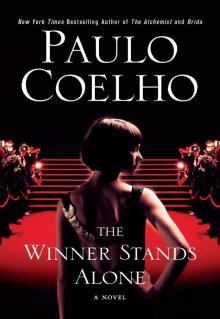 The Winner Stands Alone
The Winner Stands Alone The Spy
The Spy By the River Piedra I Sat Down and Wept: A Novel of Forgiveness
By the River Piedra I Sat Down and Wept: A Novel of Forgiveness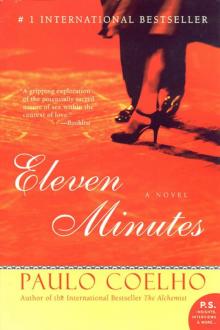 Eleven Minutes
Eleven Minutes Manuscript Found in Accra
Manuscript Found in Accra Warrior of the Light
Warrior of the Light Veronika Decides to Die: A Novel of Redemption
Veronika Decides to Die: A Novel of Redemption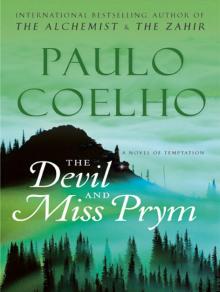 The Devil and Miss Prym: A Novel of Temptation
The Devil and Miss Prym: A Novel of Temptation The Valkyries: An Encounter With Angels
The Valkyries: An Encounter With Angels Brida: A Novel
Brida: A Novel Fifth Mountain: A Novel
Fifth Mountain: A Novel Adultery
Adultery Inspirations
Inspirations The Archer
The Archer The Witch of Portobello
The Witch of Portobello The Pilgrimage
The Pilgrimage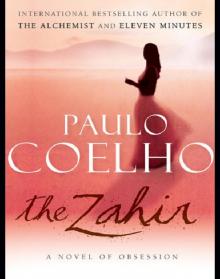 The Zahir
The Zahir Brida
Brida The Fifth Mountain
The Fifth Mountain Like the Flowing River: Thoughts and Reflections
Like the Flowing River: Thoughts and Reflections Manual of the Warrior of Light
Manual of the Warrior of Light By The River Piedra I Sat Down & Wept
By The River Piedra I Sat Down & Wept The Supreme Gift
The Supreme Gift Aleph
Aleph Hippie
Hippie Witch of Portobello
Witch of Portobello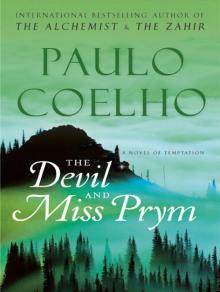 The Devil and Miss Prym
The Devil and Miss Prym The Alchemist - 10th Anniversary Edition
The Alchemist - 10th Anniversary Edition The Valkyries
The Valkyries